Henry Cloud's Blog, page 26
January 12, 2015
How to Test the Quality of Any Relationship
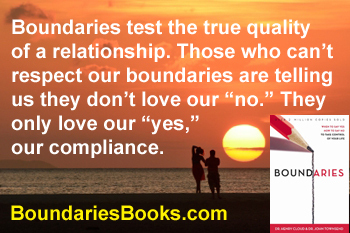 Usually the quiet one in her group, Debbie spoke up. The topic of discussion was “conflict resolution,” and she couldn’t be silent another second. “I know how to present facts and arguments about my opinion in a caring way. But my husband will walk out on me if I start disagreeing! Now what do I do?”
Usually the quiet one in her group, Debbie spoke up. The topic of discussion was “conflict resolution,” and she couldn’t be silent another second. “I know how to present facts and arguments about my opinion in a caring way. But my husband will walk out on me if I start disagreeing! Now what do I do?”
Debbie’s problem is shared by many. She genuinely believes in boundaries, but she is terrified of their consequences.
Is it possible that others will become angry at our boundaries and attack or withdraw from us? Absolutely. God never gave us the power or the right to control how others respond to our no. Some will welcome it; some will hate it.
We can’t manipulate people into swallowing our boundaries by sugarcoating them. Boundaries are a “litmus test” for the quality of our relationships. Those people in our lives who can respect our boundaries will love our wills, our opinions, our separateness. Those who can’t respect our boundaries are telling us that they don’t love our “no.” They only love our “yes,” our compliance.
So what does Debbie, whose husband is an avowed “boundary buster,” do? Will her husband carry out his threat to walk out on her? She can’t control his response. But if the only thing keeping Debbie’s husband home is her total compliance, is this a marriage at all? And how will problems ever be addressed when she and he avoid them?
Setting limits has to do with telling the truth. First, there is the person who welcomes your boundaries. Who accepts them. Who listens to them. Who says, “I’m glad you have a separate opinion. It makes me a better person.” This person is called wise.
The second type hates limits. Resents your difference. Tries to manipulate you into giving up your treasures. Try our “litmus test” experiment with your significant relationships. Tell them “no” in some area. You’ll either come out with increased intimacy — or learn that there was very little to begin with.
Do Debbie’s boundaries with her husband condemn her to a life of isolation? Absolutely not. If telling the truth causes someone to leave you, this gives the church an opportunity to provide support and a spiritual and emotional “home” to the abandoned person.
In no way are we advocating divorce. The point is that you can’t make anyone stay with or love you. Ultimately that is up to your partner. Sometimes setting boundaries clarifies that you were left a long time ago, in every way, perhaps, except physically. Often, when a crisis like this occurs, it helps the struggling couple reconcile and remake their marriage into a more biblical one. The problem was raised, and now can be addressed.
Warning: the boundaryless spouse who develops limits begins changing in the marriage. There are more disagreements. There are more conflicts over values, schedules, money, kids, and sex. Quite often, however, the limits help the out-of-control spouse begin to experience the necessary pain that can motivate him or her to take more responsibility in the marriage. Many marriages are strengthened after boundaries are set because the spouse begins to miss the relationship.
Will some people abandon or attack us for having boundaries? Yes. But, it’s better to learn about their character and take steps to fix the problem than never to know in the first place.
 With over 2 million copies sold, Boundaries is the best resource for learning how to set limits and make wise decisions in any relationship.
With over 2 million copies sold, Boundaries is the best resource for learning how to set limits and make wise decisions in any relationship.
Click here to purchase your copy today
Sunset image courtesy of Artzsamui at FreeDigitalPhotos.net
The post How to Test the Quality of Any Relationship appeared first on Boundaries Books.
January 8, 2015
Boundaries Q&A with Dr. John Townsend: How to Handle Conflict with In-Laws
 Question:
Question:
Dr. Townsend, I am experiencing conflict with my in-laws about the way I raise my children. They tend to nit-pick every decision that I make. Do you have any tips for setting boundaries with in-laws?
I know it’s no fun to feel conflict with your in-laws. Here are some ways to address the sensitive issue. Begin with a positive and vulnerable conversation. Simply wait until there is a quiet moment, where there’s not a lot going on.
Then say, “I’m glad you are involved and engaged with us and our kids. And, I always want to be open to feedback when I might not be the best parent for them. I appreciate you wanting to give me feedback, but sometimes it’s a bit too much for me. Would you mind asking me if it’s a good time to give me feedback before you bring up something about the kids? That will feel more connected and helpful to me.”
If they are safe people, they will probably respond positively and adapt to your request.
On the other hand, if they react defensively, then you may need to consider setting boundaries around your time together. In that case, I recommend reading these resources:
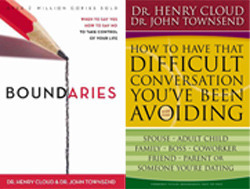 Boundaries
Boundaries
Chapter 7 – “Boundaries and Your Family”
How to Have That Difficult Conversation You’ve Been Avoiding
Chapter 18 – “Dealing with Blame, Counterattack, and Other Problems”
Click on the book title links above for details and purchasing
Got a question for Dr. Townsend? Send them to us via email at: BoundariesBooksTeam@gmail.com
Due to Dr. Townsend’s busy schedule, not all questions will be able to be addressed and answered.
The post Boundaries Q&A with Dr. John Townsend: How to Handle Conflict with In-Laws appeared first on Boundaries Books.
January 5, 2015
The First Law of Boundaries – Sowing and Reaping
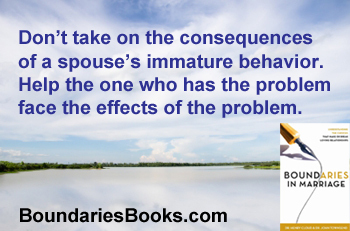 Amy and Randall had been married for eight years, and they loved each other. However, when he was angry or upset, Randall became moody and would withdraw from Amy and the kids, except for occasional outbursts of anger. When his manufacturing business was struggling, he would sit silently through dinner. Once, during this period, the children were arguing at the dinner table. Out of the blue, Randall said, “Amy, can’t you keep these children in line? I can’t even have a moment’s peace in my own home!” And with that, he stormed out of the kitchen into his home office, turned on the computer, and stayed there until the kids went to bed.
Amy and Randall had been married for eight years, and they loved each other. However, when he was angry or upset, Randall became moody and would withdraw from Amy and the kids, except for occasional outbursts of anger. When his manufacturing business was struggling, he would sit silently through dinner. Once, during this period, the children were arguing at the dinner table. Out of the blue, Randall said, “Amy, can’t you keep these children in line? I can’t even have a moment’s peace in my own home!” And with that, he stormed out of the kitchen into his home office, turned on the computer, and stayed there until the kids went to bed.
Amy was hurt and confused. But she had a pattern of “handling” Randall’s moods. She would try to cheer him up by being positive, encouraging, and compliant. “He has a hard job,” Amy would think. “Nurturance is what he needs.” And for the next few hours, and sometimes days, she would center the family’s existence around Dad’s mood. Everyone would walk on eggshells around him. No one was to complain or be negative about any subject, for fear of setting him off again. And Amy would constantly try to draw him out, affirm him, and make him happy. All her emotional energy went into helping Randall feel better.
Amy and Randall’s struggle illustrates the importance of the first law of boundaries: “The Law of Sowing and Reaping.” Simply put, this principle means that our actions have consequences. When we do loving, responsible things, people draw close to us. When we are unloving or irresponsible, people withdraw from us by emotionally shutting down, or avoiding us, or eventually leaving the relationship.
In their marriage, Randall was sowing anger, selfishness, and withdrawal of love. These hurt Amy’s feelings and disrupted the family. Yet Randall was not paying any consequences for what he was sowing. He could have his tantrum, get over it, and go about his business as if nothing had happened. Amy, however, had a problem. She was bearing the entire burden of his moodiness. She stopped what she was doing to take on the project of changing her moody husband into a happy man. Randall was “playing,” and Amy was “paying.” And because of this, he was not changing his ways. Randall had no incentive to change, as Amy, not he, was dealing with his problem.
What consequence should Randall have been experiencing? Amy could have said to him, “Honey, I know you’re under stress, and I want to support any way I can. But your withdrawal and rage hurt me and the children. They are unacceptable. I want you to talk more respectfully to us when you’re in a bad mood. The next time you yell at us like that, we’ll need some emotional distance from you for a while. We may leave the house and go to a movie or see some friends.” Then Randall would have to deal with the result of his actions: loneliness and isolation.
When you sow mistreatment of people, you should reap people’s not wanting to be around you. It is to be hoped that the pain of this loneliness would help Randall take steps to deal with his feelings. Sowing and reaping has to do with how spouses affect and impact each other’s heart. Amy and Randall had a problem in relational sowing and reaping. He was being hurtful and difficult, yet Amy took the consequences of his behavior for him.
In their relationship, the one who has the problem isn’t facing the effects of the problem. And things don’t change in a marriage until the spouse who is taking responsibility for a problem that is not hers decides to say or do something about it. This can range from mentioning how her spouse’s behavior hurts her feelings, all the way to setting a limit on the behavior. This helps place both the sowing and the reaping with the same person and begins to solve the boundary violation.
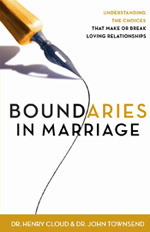 Whether you’re a newlywed or married for many years, learn how Boundaries in Marriage will help you build a foundation for your relationship to flourish.
Whether you’re a newlywed or married for many years, learn how Boundaries in Marriage will help you build a foundation for your relationship to flourish.
Image background courtesy of rakratchada torsap at FreeDigitalPhotos.net
The post The First Law of Boundaries – Sowing and Reaping appeared first on Boundaries Books.
December 28, 2014
The Best Boundaries Advice from 2014
 We hope you’re enjoying the holiday season, and we wish you a Happy New Year. As we look back over 2014, we thought it would be fun to review the Top 10 Most Popular Boundaries Articles of the year.
We hope you’re enjoying the holiday season, and we wish you a Happy New Year. As we look back over 2014, we thought it would be fun to review the Top 10 Most Popular Boundaries Articles of the year.
We calculated the 10 most visited and highly shared articles from the past 12 months. The following list is like getting a condensed version of this year’s best boundaries advice from Dr. Henry Cloud and Dr. John Townsend.
Top 10 Most Popular Boundaries Articles of 2014
Click the links to read each article
1. Say No to Disrespect in Dating
2. Why Smart People Accept Unacceptable Relationships
3. How Happiness Can Hurt Your Marriage
4. Why Unhealed People Attract Unhealthy Relationships
5. How to Love When You’re Out of Love
6. Eight Must-Have Moments to Make Love Last
8. How to Resolve Conflict with a Resistant Spouse
9. The Secret to Changing Your Spouse
10. How to Forgive When It’s Hard to Forget
Take a moment to read any of the great articles that you may have missed, and please share these articles with your friends and family.
Boundaries make life better, and we want to help you make 2015 the best year possible!
Top 10 image courtesy of Stuart Miles at FreeDigitalPhotos.net
The post The Best Boundaries Advice from 2014 appeared first on Boundaries Books.
December 18, 2014
How to Set Holiday Boundaries with Family
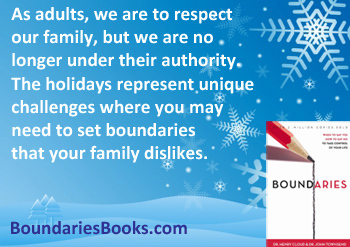 When you were born, God placed you into a family for a season of time to help you grow into a mature adult. At some point this season ends, and your relationship with your parents changes from child-to-parent to adult-to-adult. The roles change from dependency and authority to mutuality. While you are to respect and care for your mother and father, you are no longer under their protection and tutelage. Children are to obey parents, while adult children are to love and honor them. Therefore, situations will occur where you need to make decisions and set boundaries with family with which they may not agree.
When you were born, God placed you into a family for a season of time to help you grow into a mature adult. At some point this season ends, and your relationship with your parents changes from child-to-parent to adult-to-adult. The roles change from dependency and authority to mutuality. While you are to respect and care for your mother and father, you are no longer under their protection and tutelage. Children are to obey parents, while adult children are to love and honor them. Therefore, situations will occur where you need to make decisions and set boundaries with family with which they may not agree.
For example, you might decide to spend some traditional holiday time apart from your family. This can often be a cause for a confrontational talk:
You: “Mom, I wanted to let you know as soon as I could that I’ve made plans to go to the mountains with some friends this Christmas. I know this will be the first Christmas I won’t be with you and Dad, so I wanted to talk to you about it.”
Mom: “What are you talking about? You always spend Christmas with us. Your father will be so hurt.”
You: “I’m so sorry you feel that way. I would never want to hurt you. But this year I have a really good group of friends that I want to spend the holidays with. It’s not about not caring about you; it’s about wanting to be involved with these people at a deeper level. I’m looking forward to being with you on your birthday soon.”
Mom: “Can’t you do that at another time? I mean, it will ruin our Christmas.”
You: “I hope it doesn’t ruin things for you. That’s why I’m telling you this several months in advance, so you can make sure you have time to make any other arrangements you need to so your holiday will be good.”
Mom: “Don’t you care about how we feel?”
You: “Yes, Mom, I care very much. And I do like spending time with you. If you think that I don’t care, then maybe we can talk at some other point about your feelings, because I would like to reassure you that I care. But the point of this phone call was simply to give you a heads up so that we can plan and adjust for this change.”
Setting Boundaries with Family: Distinguish Between Hurt and Harm
Ultimately, you may have to distinguish between hurting and harming your family. You might cause your parent or relative discomfort in the conversation, which hurts, or you might say something unkind or unloving, which harms. The truth you want to communicate may be painful for your family (hurt them), but it will not injure them (harm them). Some adult children perceive their family members as fragile and brittle, and they do not confront needed problems because they fear any hurt will injure them.
Give your family time and space to evaluate their reactions, and see if they are being hurt or harmed. If they are angry or somewhat pouty, that is one thing. But if they seem more deeply affected—for example, withdrawing from the relationship due to pain, rather than in a manipulative “Look what you did to me” way—that is another thing. Consult with others who know your family to see whether they are genuinely unable to digest feedback without injury or is merely reacting.
You shouldn’t avoid setting boundaries over holiday issues because someone responds with hurt or anger. Deciding to set boundaries is difficult because it requires decision making and confrontation, which, in turn, may cause pain to someone you love. We need to evaluate the pain caused by our making choices and empathize with it.
Take Sandy, for example. Sandy chose to go skiing with friends instead of going home for Christmas vacation. Her mother was sad and disappointed, but she was not harmed. Sandy’s decision caused sadness, but her mother’s sadness should not cause Sandy to change her mind. A loving response to her mother’s hurt would be, “Oh, Mom, I’m sad that we won’t be together too. I’m looking forward to next summer’s visit.”
If Sandy’s mother respected her freedom to make choices, she would say something like this: “I’m so disappointed that you’re not coming home for Christmas, but I hope you all have a great time.” She would be owning her disappointment and respecting Sandy’s choice to spend her time with friends.
We need to evaluate the pain our decisions cause other people. We need to see how this hurt is helpful to others and sometimes the best thing we can do for them and the relationship. As adults, we are to respect our family, but we are no longer under their authority. The holidays represent unique challenges where you may make a decision that your family dislikes. But, as you and your family give the freedom to make your own choices, genuine love can be expressed that works to strengthen your relationship.
Get more helpful holiday advice to set boundaries with family in our free resource, Boundaries for the Holidays. Download our 10-page e-book today by subscribing to our email newsletter in the box below:
“Blue Winter Scene” courtesy of Paul at FreeDigitalPhotos.net
The post How to Set Holiday Boundaries with Family appeared first on Boundaries Books.
December 15, 2014
Why Parents Cover for Their Kid’s Problems
 Children need more than a parent who will talk about boundaries. They need a parent who will be boundaries. This means that in whatever situation arises, you respond to your child with empathy, firmness, freedom, and consequences. This is how God handles his children, and he is our model. But, sometimes parents contribute to the problem by trying to justify their kid’s behavior, rather than addressing the issue.
Children need more than a parent who will talk about boundaries. They need a parent who will be boundaries. This means that in whatever situation arises, you respond to your child with empathy, firmness, freedom, and consequences. This is how God handles his children, and he is our model. But, sometimes parents contribute to the problem by trying to justify their kid’s behavior, rather than addressing the issue.
Setting boundaries with kids isn’t about “making” your child do anything. It is much more about structuring your child’s existence so that he experiences the consequences of his behavior, thus leading him to be more responsible and caring. Use the following three key steps to help begin the process with your kids:
Step 1: Acknowledge that your child is not perfect.
All kids are immature sinners; this is our human condition. Some parents have difficulty with this first step. They deny their child’s behavior. They rationalize genuine problems. For example, smarting off becomes a cute sense of humor. Laziness becomes fatigue. Intrusiveness becomes high-spiritedness.
Parents rationalize their child’s problems for many reasons. Some do it to avoid guilty feelings. Some don’t want their own perfectionism challenged. Some feel as if their child is being victimized. Others don’t want to be embarrassed. Still others don’t want to go through the effort of disciplining. Parents need to look at the possibility that they might be sacrificing their child’s well-being to protect their own sense of comfort and well-being. God never denied our craziness, and he went through the ultimate discomfort to solve the problem. Be a parent.
Step 2: Identify problems that aren’t really problems
After acknowledging that your child isn’t perfect, the next step is to identify that some of your child’s behavior problems aren’t really the problem. The action or attitude driving you crazy isn’t the real issue. It is the symptom of another issue, which in many cases is a boundary problem. Your child’s behavior may be driven by something broken or undeveloped within her character. The symptom alerts you to the inner problem.
Don’t just react to the symptom, or you will be guaranteeing more problems later. Parents often have a knee-jerk reaction in a crisis, then back off from their job when the crisis resolves. A boundaryless child will have symptoms until she develops boundaries. Here are some examples of problems that aren’t really the problem:
Outward Problem:
Boundary Problem:
Bad grades
Lack of concern about consequences
Controls other kids
Lack of respect for other’s boundaries
Doesn’t listen to instruction
Lack of fear of consequences
Defiant attitude
Lack of boundaries or entitlement
Step 3: Realize that time does not heal problems
The third step you will need to come to terms with is that time does not heal all. Many parents avoid addressing boundary problems because someone told them, “Just wait it out. They’ll get older.” Yes, your kids will get older. But, how many 42-year-olds do you know who are getting older but still have no boundaries? Time is only a context for healing. It is not the healing process itself. Infections need more than time; they need antibiotics.
In fact, avoiding dealing with problems in your child simply gives the Devil more opportunity to stunt his growth (see Ephesians 4:26-27). Time is a necessary but not sufficient condition for boundary growth and repair. You also need lots of love, grace, and truth for your child. Get involved in the repair process. With nothing but time, things do not improve, but break down further.
The words “parenting” and “problems” sometimes seem to be redundancies. You may simply be preventing problems in your child. Or you may have a troublesome situation that is breaking your heart. Yet, God has anticipated it, is fully aware of it, and wants to help you to help your child develop boundaries. He has provided hope for your and your child’s future that is real and helpful.
Don’t give up on your child, even as they enter adulthood. You are the only mom or dad they will ever have; no one in the world has the position of influence in their heart that you do.
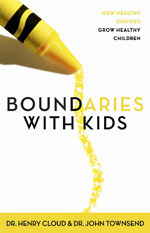 Get more proven advice to raise kids who take responsibility for their actions, attitudes, and emotions in Boundaries With Kids. Drs. Henry Cloud and John Townsend take you through the ins and outs of instilling the kind of character in your children that will help them lead balanced, productive, and fulfilling adult lives. Learn how to:
Get more proven advice to raise kids who take responsibility for their actions, attitudes, and emotions in Boundaries With Kids. Drs. Henry Cloud and John Townsend take you through the ins and outs of instilling the kind of character in your children that will help them lead balanced, productive, and fulfilling adult lives. Learn how to:
Set limits and still be a loving parent.
Bring control to a chaotic family life.
Define age-appropriate boundaries and consequences for your kids.
Click here to read a sample chapter, watch a teaching video, and purchase your copy.
“Family” image courtesy of arztsamui at FreeDigitalPhotos.net
The post Why Parents Cover for Their Kid’s Problems appeared first on Boundaries Books.
December 11, 2014
Conflict Makes Relationships Work
 What is your normal reaction when conflict occurs in a new relationship? Are you comfortable addressing the issue? Or, do you stuff the issue out of fear or a desire preserve the peace? Honesty is the best policy for two important reasons:
What is your normal reaction when conflict occurs in a new relationship? Are you comfortable addressing the issue? Or, do you stuff the issue out of fear or a desire preserve the peace? Honesty is the best policy for two important reasons:
1. Being honest helps resolve the hurt or the conflict.
2. When you are honest, how the other person responds tells you whether a satisfactory relationship is possible.
If you are hurt in some way, bring it up. Don’t harbor bitter feelings. Or, if there is something that the other person has done that you do not like, or goes against your values, or is wrong, it must be discussed. If you don’t, then you are building a relationship based on a false sense of security and closeness. And it is possible that your feelings will be confused by hurt and fear. A lot is lost in not finding out who the other person is and where the relationship could really go, if one or both people are not facing hurt and conflict directly. In reality, a conflict-free relationship is probably a shallow relationship.
Second, you need to find out if the person you are with is capable of dealing with conflict and hurt directly. The Bible and all relationship research is very clear on this issue: people who can handle confrontation and feedback are the ones who can make relationships work. You must find out, sooner rather than later, if the person you are with is someone you can talk to. If you get serious with someone who cannot take feedback about hurt or conflict, then you are headed for a lifetime of aloneness, resentment, and perhaps even abuse.
Proverbs puts it well about a person who cannot take confrontation: “Do not rebuke a mocker or he will hate you; rebuke a wise man and he will love you” (Proverbs 9:8). “A mocker resents correction; he will not consult the wise” (Proverbs 15:12).
Whether you’re dating someone, starting a new friendship, or building a business alliance, you need to know if you are in a relationship with someone who is going to be defensive when you bring up hurt or conflict, or if you are with someone who is going to be able to listen, learn, and respond. If you do not deal with conflict early on, and the relationship gets serious, then you have bought yourself a world of trouble.
Honesty over hurt and conflict creates intimacy, and it also divides people into the wise and the foolish. But being honest is totally up to you. You cannot control what the other person does. However, you can decide what kind of person you are going to be. As a result, you will also be deciding what kind of person you are going to be with.
 Does the thought of addressing conflict with another person makes your skin crawl? If so, we recommend the Boundaries Survival Kit. Get practical life-changing advice from Drs. Henry Cloud and John Townsend in their award-winning books, Boundaries and How to Have That Difficult Conversation You’ve Been Avoiding.
Does the thought of addressing conflict with another person makes your skin crawl? If so, we recommend the Boundaries Survival Kit. Get practical life-changing advice from Drs. Henry Cloud and John Townsend in their award-winning books, Boundaries and How to Have That Difficult Conversation You’ve Been Avoiding.
The post Conflict Makes Relationships Work appeared first on Boundaries Books.
December 7, 2014
Why Unhealed People Attract Unhealthy Relationships
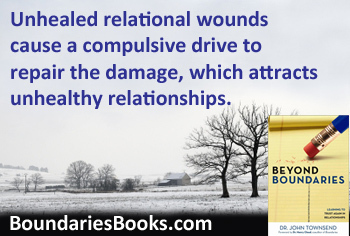 Unhealed relational wounds drive us to compulsive attempts to repair the damage. That is, without being aware of it, we seek out people we believe can “fix” what’s wrong with us or help us find a piece of ourselves we feel is missing. We function emotionally like the starving man who looks in a dumpster and sees lunch instead of garbage. His perception is so driven by his need that he is willing to eat something that might make him sick.
Unhealed relational wounds drive us to compulsive attempts to repair the damage. That is, without being aware of it, we seek out people we believe can “fix” what’s wrong with us or help us find a piece of ourselves we feel is missing. We function emotionally like the starving man who looks in a dumpster and sees lunch instead of garbage. His perception is so driven by his need that he is willing to eat something that might make him sick.
Though we may not be aware of it, something in us wants completeness. God has “set eternity in the human heart” (Ecclesiastes 3:11), and we long for him and the full life he promises. But if we remain unaware of the powerful forces at work within us, such as our family dynamic and how we responded to it, we can be blind to its influence and seek out the completeness we lack by making all the wrong choices. For example, consider the following scenarios:
The overly nice person lacks assertiveness and the ability to confront, so he attracts controlling and aggressive people.
The overly angry person can’t allow herself to feel helpless or sad, so she finds empathic people who won’t confront her moods.
The rigid, black-and-white person is not able to let go of control, so he seeks out spontaneous, creative people who won’t try to control him.
The over-responsible, guilt-ridden person lacks self-care, so she finds self-absorbed people who care for no one but themselves.
Of course, the problem is that these kinds of responses do not reflect God’s intentions for us. And they don’t lead to healthy or fulfilling connections.
These missing pieces are part of what is called the “internalization process.” We become who we are by incorporating experiences that we have with other people. On a developmental level, kids come into this life incomplete. In the process of healthy development, they receive safety and acceptance and develop assertiveness, self-control, and self-care that prepare them for life on their own. Once internalization is complete, we become functioning adults who are called to pursue wholeness; or, in Jesus’ words, “What I’m saying is, Grow up. You’re kingdom subjects. Now live like it. Live out your God-created identity” (Matthew 5:48).
What Jesus means is that he wants us to be mature and complete. But we are not complete. We have missing pieces—soul holes we carry from childhood into adulthood. The path to completeness or wholeness is to find a relational context, such as a healthy church, small group, mentor, or therapist, who can help us finish the emotional work that enables us to grow into the capacities we lack and become who we are meant to be.
This is especially important in romantic relationships, where there is often a glitch in our emotional hardware. We feel strongly that the other person will complete us, but not in the way I am describing. It is not about becoming more connected, intimate, assertive, or real. It is about being in the presence of someone else who has those attributes without having to take responsibility to learn them.
“You complete me” is a great line from the movie, “Jerry Maguire,” but it doesn’t work in real relationships. You can’t outsource health. You must learn it all and take it inside your skin. Complete people then attract other complete people. That is why most of us need to put less energy into romance and more into personal growth. It pays off later in romance.
Understanding your missing pieces also pays off in other ways. Perhaps your concern isn’t about a marriage or dating relationship. It may be that the difficult relationship you need to address is with your parents, siblings, or a person from your childhood. Or it’s about a work relationship. Whatever your interest, you will find great benefit, in looking at the missing pieces, to understanding why things ended up like they did. The more information, the better for you.
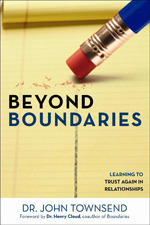 Don’t let unhealed relational wounds or the pain of a past relationship affect your future. You can prevent the past from repeating itself. Read Beyond Boundaries to discover how to tell who you can trust, when the time is right to be vulnerable, and learn the keys to identify a healthy relationship.
Don’t let unhealed relational wounds or the pain of a past relationship affect your future. You can prevent the past from repeating itself. Read Beyond Boundaries to discover how to tell who you can trust, when the time is right to be vulnerable, and learn the keys to identify a healthy relationship.
Click here to read a sample chapter, watch a free video, and purchase your copy.
Winter Trees image courtesy of Dan at FreeDigitalImages.net
The post Why Unhealed People Attract Unhealthy Relationships appeared first on Boundaries Books.
December 4, 2014
Are You Carrying Someone’s Burden or Boulder?
 We are responsible to others and for ourselves. “Carry each other’s burdens,” says Galatians 6:2, “and in this way you will fulfill the law of Christ.” This verse shows our responsibility to one another.
We are responsible to others and for ourselves. “Carry each other’s burdens,” says Galatians 6:2, “and in this way you will fulfill the law of Christ.” This verse shows our responsibility to one another.
Many times, others have “burdens” that are too big to bear. They do not have enough strength, resources, or knowledge to carry the load, and they need help. Denying ourselves to do for others what they cannot do for themselves is showing the sacrificial love of Christ. This is what Christ did for us. He did what we could not do for ourselves; he saved us. This is being responsible “to.”
On the other hand, Galatians 6:5 says that “each one should carry his own load.” Everyone has responsibilities that only he or she can carry. These things are our own particular “load” that we need to take daily responsibility for and work out. No one can do certain things for us. We have to take ownership of certain aspects of life that are our own “load.”
The Greek words for burden and load give us insight into the meaning of these texts. The Greek word for burden means “excess burdens,” or burdens that are so heavy that they weigh us down. These burdens are like boulders. They can crush us. We shouldn’t be expected to carry a boulder by ourselves! It would break our backs. We need help with the boulders — those times of crisis and tragedy in our lives.
In contrast, the Greek word for load means “cargo,” or “the burden of daily toil.” This word describes the everyday things we all need to do. These loads are like knapsacks. Knapsacks are possible to carry. We are expected to carry our own. We are expected to deal with our own feelings, attitudes, and behaviors, as well as the responsibilities God has given to each one of us, even though it takes effort.
Problems arise when people act as if their “boulders” are daily loads, and refuse help, or as if their “daily loads” are boulders they shouldn’t have to carry. The results of these two instances are either perpetual pain or irresponsibility.
Lest we stay in pain or become irresponsible, it is very important to determine what “me” is, where my boundary of responsibility is and where someone else’s begins. The Bible tells us clearly what our parameters are and how to protect them, but often our family, or other past relationships, confuses us about our parameters.
In addition to showing us what we are responsible for, boundaries help us to define what is not on our property and what we are not responsible for. We are not, for example, responsible for other people. Nowhere are we commanded to have “other-control,” although we spend a lot of time and energy trying to get it!
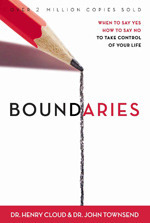 Learn the difference between burdens and boulders in the award-winning book, Boundaries. You can set limits with other people and still be a loving person. Discover when to say yes and how to say no in any situation.
Learn the difference between burdens and boulders in the award-winning book, Boundaries. You can set limits with other people and still be a loving person. Discover when to say yes and how to say no in any situation.
Stone image courtesy of Witthaya Phonsawat at FreeDigitalPhotos.net
The post Are You Carrying Someone’s Burden or Boulder? appeared first on Boundaries Books.
December 1, 2014
How to Heal Any Marriage
 I (Dr. Cloud) was leading a seminar, and I asked the audience of married couples to stop for a moment and think of their spouse. I told them to think of all of the wonderful things that they love about their spouse and to concentrate on how awesome that person is and how much they love him or her. “Think of the wonderful qualities that you admire and that attracted you to that person. Let those feelings fill you,” I told them.
I (Dr. Cloud) was leading a seminar, and I asked the audience of married couples to stop for a moment and think of their spouse. I told them to think of all of the wonderful things that they love about their spouse and to concentrate on how awesome that person is and how much they love him or her. “Think of the wonderful qualities that you admire and that attracted you to that person. Let those feelings fill you,” I told them.
Then, after they were feeling all giddy and in love again, I asked each person to turn to their spouse who was idealizing them at that moment and to repeat after me, “Honey, I am a sinner. I will fail you, and I will hurt you.”
You could feel the sense of discombobulation in the room. In one moment, they were shaken from the ideal to the real. Some began to laugh as they got it. Some felt even closer to each other. Some looked up confused as if they did not know what to do with my invitation.
But that is reality. The person you love the most and have committed your life to is an imperfect being. This person is guaranteed to hurt you and fail you in many ways, some serious and some not. You can expect the failures to come. As the Bible says in Ecclesiastes 7:20, “There is not a righteous man on earth who does what is right and never sins.” We can expect failure from even the best people in our lives.
So the question becomes, “What then?” What do you do when your spouse fails you in some way or is less than you wish for him to be? What happens when she has a weakness or a failure? How about an inability to do something? What about an unresolved childhood hurt that he brings to the relationship?
Other than denial, there are only a couple of options. You can beat him up for his imperfections, or you can love him out of them. The Bible says, “Love covers over a multitude of sins” (1 Peter 4:8). Nothing in a relationship has to permanently destroy that relationship if forgiveness is in the picture. No failure is larger than grace. No hurt exists that love cannot heal. But, for all of these miracles to take place, there must be compassion and tenderheartedness.
 What does that mean? I like how the Bible describes God’s compassion: “to bend or stoop in kindness to an inferior” (Strong’s Hebrew and Greek Dictionary). For God to have compassion on our brokenness or sin is certainly to stoop to an inferior. But we need the same attitude toward an equal spouse for two reasons:
What does that mean? I like how the Bible describes God’s compassion: “to bend or stoop in kindness to an inferior” (Strong’s Hebrew and Greek Dictionary). For God to have compassion on our brokenness or sin is certainly to stoop to an inferior. But we need the same attitude toward an equal spouse for two reasons:
First, you forgive what is inferior to the ideal standard. You humble yourself to identify with your loved one, who is experiencing life in a way that is less than you or even he would want. You give up all demands for your spouse to be something he isn’t at that moment.
Second, if your spouse is hurting or failing, you are not morally superior, but you are in the stronger position at that moment to be able to help. God never uses the stronger position to hurt, but always to help. As Paul puts it in Colossians 3:12-14, “Therefore, as God’s chosen people, holy and dearly loved, clothe yourselves with compassion, kindness, humility, gentleness and patience. Bear with each other and forgive whatever grievances you may have against one another. Forgive as the Lord forgave you. And over all these virtues put on love, which binds them all together in perfect unity.”
What a picture that is! “Clothe yourselves with compassion, kindness, humility, gentleness and patience.” What if you “wore” these qualities every time your spouse failed or was hurting? I think we would see a lot more healed marriages.
But that is not the human way. The human way is to harden our hearts when we are hurt or offended.
I was talking to a friend the other day who had offended his wife in a relatively minor way. But to her it was not minor at all. As a result, she did not speak to him for several days. Finally he asked her when she might forgive him. “Will it be before next month? Before Christmas? Just let me know so I can get ready.” She finally broke and started laughing, and things were fine again. She saw how unnecessary her “hardness of heart” was to the offense.
Hardness of heart, much more than failure, is the true relationship killer. Jesus said in Matthew 19:8 that failure is not the cause of divorce, but hardness of heart is. This is why the Bible places such a high value on tenderheartedness.
 If your marriage is struggling or you want to make a great marriage even better, Boundaries in Marriage has the answers. Learn how to:
If your marriage is struggling or you want to make a great marriage even better, Boundaries in Marriage has the answers. Learn how to:
Transform your relationship into a haven of mutual love, caring, and appreciation.
Protect your marriage from intruders, whether parents, affairs, or addictions.
Handle conflict effectively without losing your voice in the relationship.
Develop a sense of closeness and respect that you’ve never felt before.
Click here to read a sample chapter, watch a free video, and purchase your copy today.
The post How to Heal Any Marriage appeared first on Boundaries Books.




